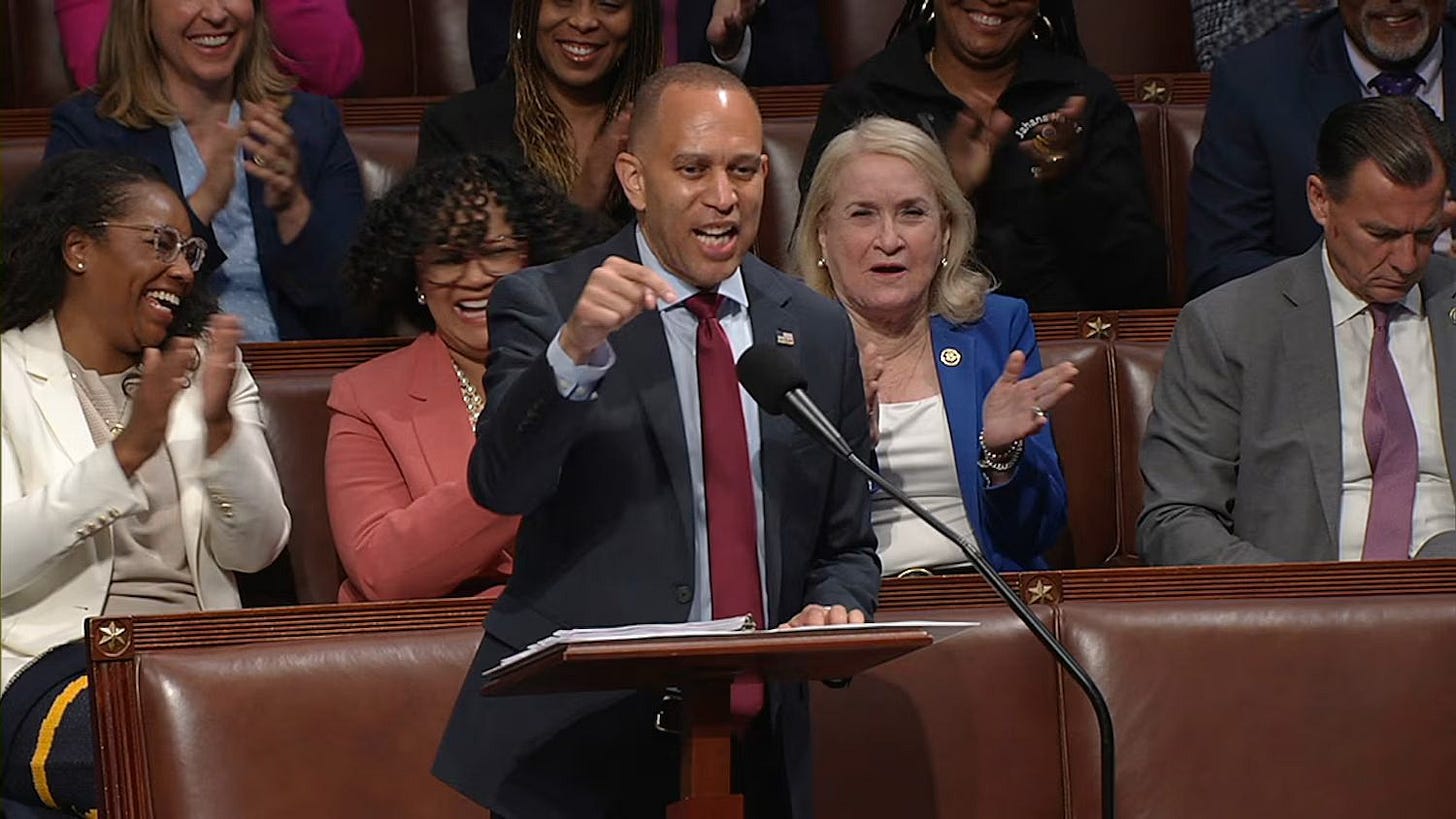Trump Week 24: Immigration Shifts, Education Cuts, and Civil Rights Rollbacks
A narrow Senate vote, Guantanamo transfers, and rollback of gender protections highlight a consequential week.

Trump’s 24th week in office brought developments in immigration enforcement, legislation, education, trans rights, and federal downsizing. Following a previous report from The Introspective detailing the death of a Canadian citizen in Immigration and Customs Enforcement (ICE) custody, another foreign national—a Cuban man—died in an ICE facility in Miami, raising new concerns as detainees from multiple continents are being transferred to Guantanamo Bay.
The Department of Justice (DOJ) instructed prosecutors to prioritize revoking citizenship from naturalized Americans convicted of crimes, escalating the administration’s anti-immigrant stance. Meanwhile, President Trump announced a “temporary pass” halting ICE raids for migrants working in agriculture and hospitality, granting employers greater control over their labor force.
In legislation, the Senate passed Trump’s “Big Beautiful” Bill—focused on tax cuts and immigration policy—with Vice President J.D. Vance casting the tie-breaking vote, as the House prepares to vote on the measure.
On LGBTQ+ rights, Iowa became the first state to remove gender identity from its civil rights code, ending protections for transgender and nonbinary residents against job and housing discrimination. At the same time, the University of Pennsylvania (UPenn), under federal pressure, banned transgender women from competing in women’s sports and agreed to nullify the NCAA records of Lia Thomas. This follows a previous report from The Introspective covering Trump’s executive order banning trans women from women’s sports nationwide. Meanwhile, the administration began withholding $6.8 billion in public school funding, impacting K–12 programs across the country.
As part of ongoing federal downsizing, the National Oceanic and Atmospheric Administration (NOAA) announced that a major weather satellite program will be discontinued by July 31—despite the ongoing hurricane season and widespread budget shortfalls.
Immigration
As anti-immigrant sentiment continues, Isidro Perez—a Cuban man—died in ICE custody in Miami, marking the second known death of a foreign national in U.S. immigration detention this term. The Introspective previously reported on the death of a Canadian citizen in ICE custody.
“Miami-Dade Rescue arrived at KSPC and initiated life-sustaining interventions to include Automated External Defibrillator shock and cardiopulmonary resuscitation, and he responded to revival methods. He was transported to Kendall Florida Hospital for further evaluation and treatment, but was pronounced deceased at 8:42 p.m. by medical staff,” ICE said in a press release.
Perez, 75, had been held at the Krome Detention Center in west Miami, where he was diagnosed with unstable angina—a heart condition that causes sudden chest pain and reduced blood flow. He died on June 26. The official cause of death remains under investigation.
The Trump administration later began transferring immigration detainees from Africa, Asia, Europe, and the Caribbean to Guantanamo Bay. CBS News reported that more than 54 detainees are currently being held at the facility, raising legal and human rights concerns.
At the same time, the DOJ directed prosecutors to prioritize revoking citizenship from naturalized Americans convicted of crimes, according to a memo from Assistant Attorney General Brett Shumate.
“The Civil Division shall prioritize and maximally pursue denaturalization proceedings in all cases permitted by law and supported by the evidence,” Shumate wrote.
In an interview with ABC News, immigration attorney Rosanna Berardi said the memo reflects how aggressively the DOJ plans to pursue these cases.
“The memo clearly signals that DOJ is going to pursue more of these cases—and not just against terrorists or war criminals. Even cases involving undisclosed criminal records or procedural errors during naturalization are now on the radar,” Berardi said.
“In the past 28 years of my practice, the government has generally left naturalized U.S. citizens alone. This is a departure from that mentality.”
Meanwhile, President Trump announced a “temporary pass” halting ICE raids for immigrants working in agriculture and the hospitality industry, granting employers more control in response to backlash.
“I don’t back away,” Trump told Fox News.
“What I do have—I cherish our farmers. And when we go into a farm and we take away people that have been working there for 15 and 20 years, who were good, who possibly came in incorrectly… what we’re going to do is something for farmers where we can let the farmer sort of be in charge. The farmer knows he’s not going to hire a murderer.”
Trump added that the administration is finalizing a plan to give temporary relief to undocumented workers in these industries.
“We’re working on it right now,” he said.
“We’re going to work it so that some kind of a temporary pass [is created], where people pay taxes, where the farmer can have a little control—as opposed to you walk in and take everybody away.”
Education and Trans Rights
Iowa on Tuesday became the first state to remove gender identity from its civil rights code, eliminating legal protections for transgender and nonbinary residents against job and housing discrimination.
The new legislation also defines male and female strictly by sex assigned at birth and eliminates the ability to change gender markers on birth certificates.
“It’s common sense to acknowledge the obvious biological differences between men and women. In fact, it’s necessary to secure genuine equal protection for women and girls,” said Iowa Gov. Kim Reynolds in a February video upon signing the legislation. She claimed the previous civil rights code “blurred the biological line between the sexes.”
In an interview with ABC Iowa, many transgender residents expressed fear as the law took effect, with some planning to leave the state.
“They are seeing from most people that are in positions of power in our country—certainly in Iowa, definitely at the federal level—that it’s completely acceptable to harm, target, and ostracize marginalized people,” said Max Mowitz, a transgender advocate.
“We’ve also seen a lot of trans Iowans making plans to move, and I know many folks who have either moved out of the state already or are planning to.”
Michelle Phillips, an attorney interviewed in the same report, said that while Iowa’s law weakens state-level protections, some federal and local laws still offer a legal shield.
“Given the myriad layers and the complexity of the federal, state, and municipality laws, they should at this point at least take some solace that it would still be difficult to take legal action based on gender identity,” said Phillips.
At the same time, following a previous Introspective report on President Trump’s executive order banning transgender women from women’s sports, the University of Pennsylvania announced it will comply with the federal directive by barring transgender athletes from women’s competitions. The university also agreed to nullify the athletic records of Lia Thomas, the first transgender woman to win an NCAA Division I national championship.
“The University of Pennsylvania will comply with Title IX of the Education Amendments Act of 1972, 20 U.S.C. §§ 1681 et seq. (‘Title IX’), as interpreted by the Department of Education, in all of its athletics programs,” the university said in a statement. The university added that “intimate” facilities such as locker rooms will be segregated by sex assigned at birth.
Education Secretary Linda McMahon called the decision a “victory” for women and girls.
“Today’s resolution agreement with UPenn is yet another example of the Trump effect in action. Thanks to the leadership of President Trump, UPenn has agreed both to apologize for its past Title IX violations and to ensure that women’s sports are protected at the University for future generations of female athletes,” McMahon said in a press release.
“The Department commends UPenn for rectifying its past harms against women and girls, and we will continue to fight relentlessly to restore Title IX’s proper application and enforce it to the fullest extent of the law.”
Meanwhile, the Trump administration has withheld more than $6 billion in federal education grants for public schools, affecting K–12 programs nationwide.
“Given the change in administrations, the Department is reviewing the FY 2025 funding for the [Title I-C, II-A, III-A, IV-A, IV-B] grant program(s), and decisions have not yet been made concerning submissions and awards for this upcoming year,” read a memo obtained by NPR.
Impacted programs include the 21st Century Community Learning Centers grant, which supports before- and after-school initiatives.
Legislation
The Senate passed President Trump’s “Big Beautiful Bill” in a 51–50 vote, with Vice President J.D. Vance casting the tie-breaking vote.
“This was an incredible victory for the American people,” said Senate Majority Leader John Thune following the vote.
The legislation includes restrictions on Medicaid—which provides health care for low-income and disabled Americans—while allocating billions of dollars in funding for the Department of Homeland Security and immigration enforcement. The package also raises the cap on the state and local tax (SALT) deduction from $10,000 to $40,000, with the cap set to revert to $10,000 after five years.
Other provisions include the elimination of tax credits for electric vehicles, new restrictions on food stamp eligibility, and a measure allowing workers to deduct certain amounts of tip wages and overtime from their taxable income.
After the bill was sent back to the House for final approval, critics raised concerns over proposed cuts to social services.
“I’ve been given 15 minutes each on a bill of such significant magnitude as it relates to the health, the safety, and the well-being of the American people—and because that debate was so limited, I feel the obligation, Mr. Speaker, to stand on this House floor and take my sweet time to tell the stories. And that’s exactly what I intend to do,” said House Minority Leader Hakeem Jeffries, who spoke for over six hours on the House floor Thursday in an attempt to delay the final vote.
“People will die. Tens of thousands, perhaps year after year after year, as a result of the Republican assault on the health care of the American people.”
The House later passed President Trump’s major tax cut and spending bill in a 218–214 vote. The legislation now heads to the president’s desk for his signature.
Climate Program
As the downsizing of the federal government continues, the National Oceanic and Atmospheric Administration (NOAA) announced that the Defense Meteorological Satellite Program (DMSP), used for weather forecasting, will be shut down on July 31—as the United States enters hurricane season.
In a statement to CBS News, NOAA spokesperson Kim Doster described the shutdown as a “routine process of data rotation and replacement.”
“The DMSP is a single dataset in a robust suite of hurricane forecasting and modeling tools in the National Weather Service portfolio,” Doster said.
Hurricane season runs through Nov. 30, with its most active period typically occurring between August and September.







